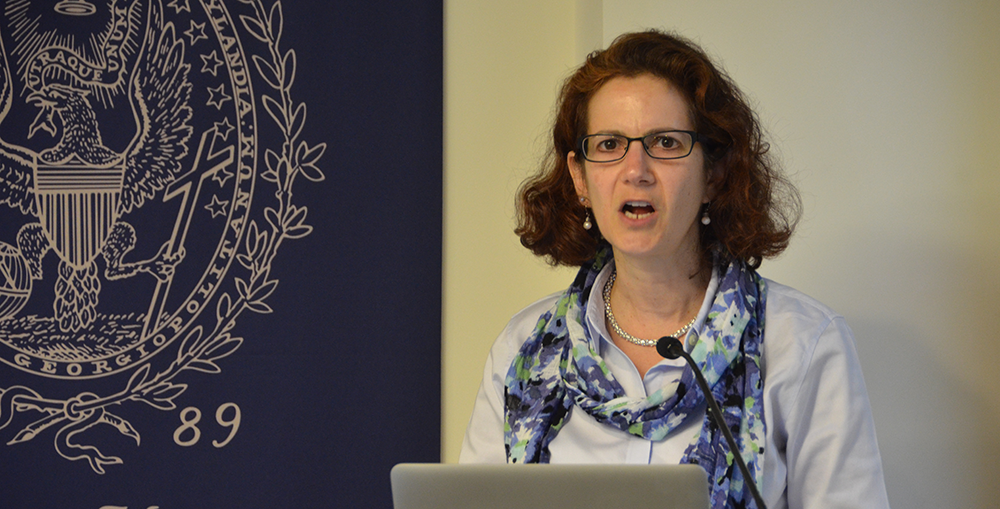
Founder of nonprofit Fund for the Future of Children Anne Brodsky participated in a panel with other researchers on children in Afghanistan at the Berkley Center on Wednesday.
Five contributors to “Children of Afghanistan: The Path to Peace,” a book on the lives of the country’s youth, participated in a panel at the Berkley Center for Religion, Peace and World Affairs on Wednesday to discuss developmental issues in a country where one in four children dies before his fifth birthday.
The panel, titled “The Future of Afghan Children,” featured Avideh Shashaani, the founder of local nonprofit Fund for the Future of Children, Anne Brodsky, the director of the gender and women’s studies program at the University of Maryland, Baltimore County, Lael Mohib, the founder of the Enabled Charity Initiative for disabled children in Afghanistan, Louise Pascale, an arts professor at Lesley University and Ashraf Zahedi, an editor of the volume.
The book consists of research and fieldwork from 21 experts on the lives of children in Afghanistan. The five panelists discussed the benefits of access to social services and education, the role of public policy and the rebuilding of Afghanistan.
Shashaani said that the struggles facing children in what the United Nations has called “the worst country in the world to be born” are often overlooked. According to Shashaani, around 50,000 children work on the streets of Kabul, the capital city of Afghanistan.
“We’re becoming numb,” Shashaani said. “We’re bombarded by statistics.”
Brodsky, who conducted 225 interviews with Afghan citizens between the ages of 13 and 85 with diverse ethnic and educational backgrounds, discussed the issues of childhood marriage and the lack of opportunities to education.
“We in the West owe it to them and so many others in the world to recognize the resilience of their strength,” Brodsky said. “Remember that for children, time is of the essence.”
Mohib said that the Afghan and international communities should prioritize initiatives for children with disabilities.
“I just became involved in this issue when I was volunteering with these children,” Mohib said. “I think it’s Afghanistan’s vision and mine … that those living with disabilities in Afghanistan will reach their full potential as human beings and be enabled to do so by their societies, their families and their government.”
According to Mohib, one in five families in Afghanistan has a severely disabled family member, and most disabled people in Afghanistan are under the 14 years old. Lack of prenatal treatment, complications at birth and war-related injuries are the most common causes of these disabilities.
“Recently, [disabilities] have not really been a donor priority,” Mohib said.
Pascale spoke about the importance of promoting music and literacy in Afghanistan. Pascale worked in the country between 1966 and 1968 with the Peace Corps and helped create a songbook for the children she taught.
“My heart stayed with Afghanistan,” Pascal said. “I started hearing about the music, and the censorship of the music, and I was distraught.”
In 2003, Pascal began to put together 5,000 songbooks in collaboration with the Afghan Embassy in Washington, D.C. Pascal said that this initiative was also an effort to increase the country’s literacy.
“Most of those schools where these songbooks were going had absolutely no books,” Pascal said.
Pascal said that education is essential to improving the lives of children in Afghanistan.
“If this is the generation that’s going to save Afghanistan, we need creative thinkers,” Pascal said. “We need problem solvers. We need critical thinkers. We need to teach those skills.”
Zahedi said trickle-down economics has not worked to tackle poverty in the country. Zahedi suggested that the Conditional Cash Transfers Program would be a short-term alternative, as it provides funds for mothers and female guardians to feed and take care of their children.
“This is just a Band-Aid … but Afghanistan needs a heart implant,” Zahedi said. “This will not change the power relations in Afghanistan. … We need to factor in the neglects that take place.”
Despite the problems plaguing Afghanistan’s children, the panel expressed hope for the future. Mohib highlighted some of the positive advancements in the country, such as the recent creation of a computer coding school for girls.
“I think … the media is often dominated by the challenges of what’s happening today in Afghanistan,” Mohib said. “The future deserves as much attention, and those who will lead us into the future: the children.”














